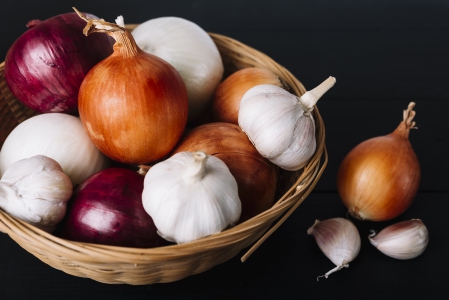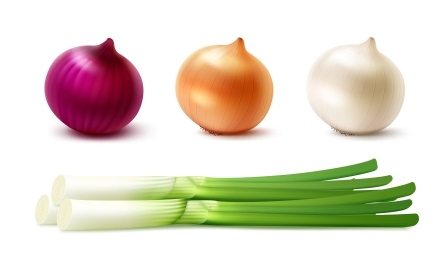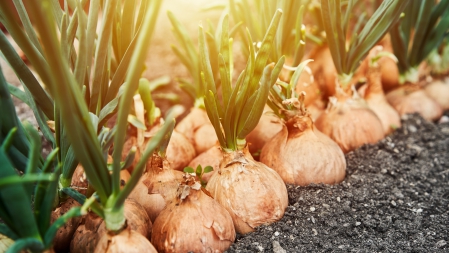Onion is an important vegetable belongs to Allium genus. It is considered as one of the most important nutrient dense food stuffs and has various health benefits.
Characteristics
- Onion may vary in color from white, yellow, pink, purple, brown to red
- It can be round, elongated and flat in shape
- It has a pungent odor
Nutritional overview
- It is considered as a perishable food as it contains large amount of moisture (about 89%)
- It contains very less amount of carbohydrates but has desirable amount of fibre
- It also contains negligible amount of proteins and fats
- It is totally free from cholesterol
- It is also known as a low caloriegenic food as it does not provide much energy during its oxidation
- It contains various micronutrients like Vitamin C, Vitamin E, Vitamin K, Vitamin B6, B9, potassium, calcium and iron
- It contains several sulfur containing compounds that exert anti-carcinogenic effects
- It contains various antioxidants (especially flavonoids) and phytochemicals as well
- It contains anthocyanin (a pigment)
Biological properties of onion
Antioxidant properties
- Onion is enriched with flavonoids, which exert strong antioxidant properties that help to protect cells from oxidative damages and promotes cellular functions
- It also reduces oxidative stress

Anti-carcinogenic properties
- Quercetin, flavonoid, antioxidant and sulfur compound of onion have anti-carcinogenic activities that help to suppress malignant cell growth and their spreading
- Consumption of onion is also related with inhibiting tumor development
- It mainly reduces the prevalence of colorectal cancer, stomach cancer, lung cancer and breast cancer
Antibacterial properties
- It is very effective for preventing bacterial infestation and their growth within body hence reduces the risk of developing infectious disease
- It shows potential antibacterial effect against Escherichia coli, Staphylococcus aureus, Pseudomonas aeruginosa, Vibrio cholera and Bacillus cereus
- It has seen that quercetin (an aglycone form of flavonoid glycosides), found in onion is responsible for inhibiting the growth of Helicobacter pylori and reduces the prevalence of peptic ulcer
Anti-inflammatory properties
- Sulfur compounds of onion are considered as one of the most effective anti-inflammatory substances that protect the body from inflammatory damages thus decreases the susceptibility of developing chronic diseases
- It also helps to reduce pain and swelling
Health benefits
Role on immunity
- Consumption of onion is extremely effective for strengthening the immune system
- Vitamin C, zinc and phytochemical components of onion are the main components accountable for building up the defense mechanism
- Selenium component of onion also helps to initiate immunological responses of body

Role on skeletal system
- It is quite helpful for promoting bone health
- It helps to increase bone mass as well as bone mineral density
- Consumption of onion helps to decrease the prevalence of bone fractures. It has seen that individual who consume onion have lesser risk (about 20%) of developing bone fractures than others
- It also helps to improve the bone density of post-menopausal women and older women, which help to decrease the risk of developing bone disorders at that age
Role on digestive health
- It helps to promote digestion
- Its fibre contents are responsible for improving bowel movement thus promotes regularity and prevents constipation
- Oligofructose and inulin components of onion are accountable for improving the growth of intestinal beneficial bacteria that promotes gut health
- Oligofructose also helps to reduce the prevalence of diarrhea
- Phytochemical components of onion are accountable for protecting the entire gastrointestinal tract from oxidative and inflammatory damages
- Consumption of onion is related with reducing the risk of developing gastric ulcer

Role on oral health
- Though consumption of onion is related with releasing a bad breath, but it plays significant role for promoting oral health by strengthening the teeth
- Vitamin C content of onion helps to enhance oral hygiene
- Its antimicrobial activities are also accountable for preventing bacterial infestation within mouth and inhibits dental infections
Role on improving vision
- It has seen that onion helps in the synthesis of glutathione, which exerts strong antioxidant activity that protects the lens of the eye from oxidative damages and promotes vision
- It is related with inhibiting the growth of normal flora on eyelid surface and conjunctiva
- It helps to improve the symptoms of conjunctivitis as its selenium content is associated with Vitamin E production, which helps to reduce the harmful consequences of conjunctivitis
Role on skin
- Vitamin K, Vitamin C and Vitamin A contents of onion play significant role for promoting skin health
- It helps to decrease pigmentation
- It also helps to protect the skin from harmful UV radiation
- It helps to treat acne as well
- Application of onion juice on skin helps to increase skin glow
- Quercetin and sulfur enriched phytochemicals component of onion is accountable for protecting the skin from free radical induced oxidative damages that help in delaying ageing process
- It helps to nourish the lip as well. It has seen that application of onion juice on lip helps to remove dead skin cells and helps to provide supple and soft lips

Role on hair
- It helps in keratin synthesis that stimulates hair growth
- Its antimicrobial properties help to keep the lice away from scalp and prevent dandruff
- It also helps to enhance the thickness of hair
Role on improving sexual health
- It helps to increase the secretion of testosterone hormone in males
- It is also related with preventing erectile dysfunction
Therapeutic advantages
Effect on cardiovascular system
- Consumption of onion is very effective for reducing cholesterol concentration that helps to reduce fat accumulation within blood vessels hence reduces the risk of developing atherosclerosis
- It helps to promote the health of blood vessels by preventing arterial hardening and facilitates proper blood supply
- It also helps to reduce the prevalence of coronary artery disease, angina pectoris, myocardial infarction, strokes and heart attacks
- Quertecin compound of onion is also very helpful for reducing hypertension
Hypoglycemic effect

- Consumption of onion is very useful for reducing blood sugar concentration as it helps to increase insulin sensitivity
- It is very effective for reducing the fasting blood sugar
Effect on respiratory health
- Flavonoid components of onion help to inhibit asthma as it helps to strengthen the capillary wall and prevent inflammation
- It also helps to protect the lining of the lungs
- It helps to guard the bronchial tubes from damages caused by pollution
- It is very effective for preventing throat swelling, bronchitis, whooping cough
Consumption of onion is very effective to reduce the prevalence of post-menopausal symptoms
Onion is incredibly useful for promoting apatite as well as sleep
It has seen that consumption of onion helps to reduce depression
It acts as diuretic as well hence its consumption is related with enhancing urine output
Onion juice along with honey act as an effective remedial action for common cold and fever
General consideration of using onion
- It can be grilled, roasted, deep fried, chopped, pickled, battered, sliced or served raw
- Excessive consumption of onion may cause bloating, gas production, stomach distress and heart burn
- Individual who have bleeding disorder should avoid onion consumption as it slows the procedure of blood clotting


Source:
Bahram‐Parvar, M. and Lim, L.T., 2018. Fresh‐cut onion: A review on processing, health benefits, and shelf‐life. Comprehensive Reviews in Food Science and Food Safety, 17(2), pp.290-308.
Bilal, A., Ayub, M.A., Mushtaq, A., Saeed, A., Azeem, M.W., Khaliq, M. and Rezgui, M., ONION: A review of its global benefits to health.
Kurrey, V.K. and Thakur, O., 2016. ONION: THE BOON FOR HEALTH. Innovative Farming, 1(4), pp.220-222.
Li, Q., Wang, Y., Mai, Y., Li, H., Wang, Z., Xu, J. and He, X., 2020. Health Benefits of the Flavonoids from Onion: Constituents and Their Pronounced Antioxidant and Anti-neuroinflammatory Capacities. Journal of Agricultural and Food Chemistry, 68(3), pp.799-807.
Pareek, S., Sagar, N.A., Sharma, S. and Kumar, V., 2017. Onion (Allium cepa L.). Fruit and vegetable phytochemicals: chemistry and human health. 2nd ed. Hoboken, NJ: Wiley Blackwell, pp.1145-1162.
S Bisen, P. and Emerald, M., 2016. Nutritional and therapeutic potential of garlic and onion (Allium sp.). Current Nutrition & Food Science, 12(3), pp.190-199.
Sidhu, J.S., Ali, M., Al-Rashdan, A. and Ahmed, N., 2019. Onion (Allium cepa L.) is potentially a good source of important antioxidants. Journal of food science and technology, 56(4), pp.1811-1819.
Wang, C.K., Health benefits of onion bioactives on hypercholesterolemia, cardiovascular diseases, and bone mineral density. Food Frontiers.




